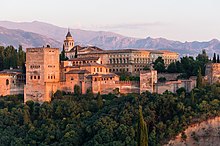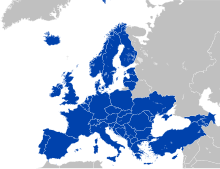3rd European Political Community Summit
[1][2][3] As had been announced by the host, Spain, the main focus of the summit was intended to be on "the current conflicts affecting the continent, the aim being to take advantage of the attendance of most European leaders to re-establish their unity vis-à-vis Russia's aggression against Ukraine".
[12] Tsikhanouskaya held bilateral meetings with the leaders of Armenia,[22] the Czech Republic,[23] Latvia,[24] Spain,[25] and with Josep Borrell, the High Representative of the European Union's Common Foreign and Security Policy.
[28] Ukrainian president Volodymyr Zelenskyy and Spanish prime minister Pedro Sánchez stressed the importance of maintaining unity across the continent.
[31] Coinciding with the summit, the European Parliament urged that EU accession talks with Moldova should open before the end of the year.
[32] Given the strained relations between Kosovo and Serbia, stemming from the Banjska attack, it is anticipated that the tense dynamic between the two nations will be a prominent subject of discussion.
[33] Chancellor Olaf Scholz affirmed that the heightened tensions between the two states will also be addressed on Thursday and Friday during the summit scheduled to take place in Granada.
[35] The leaders of Italy, the United Kingdom, The Netherlands, France, Albania, and the European Commission held a meeting about migration on the fringes of the summit.
In a statement released afterwards, they pledged to take action to tackle human trafficking by strengthening external borders to prevent unauthorized crossings, increase patrols and search and rescue operations, harmonize criminal legislation to fight against people smugglers and support sustainable development through education, job creation and climate action to help reduce migration.
[37] After failing to get the scheduled agenda scrapped, Sunak co-hosted a fringe meeting on migration with Italian prime minister Giorgia Meloni.



